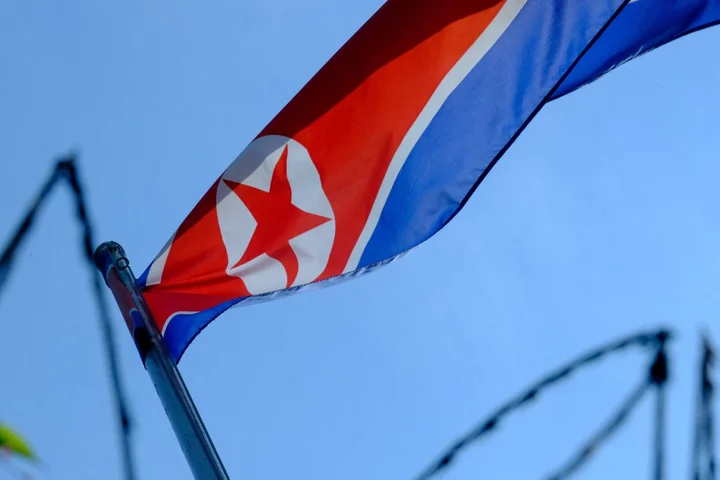Leader Kim Jong Un visited a facility assembling North Korea’s first spy satellite, indicating the state could soon conduct its first space rocket launch in about seven years.
Kim was accompanied by his preteen daughter in the field guidance visit to inspect the “military reconnaissance satellite No. 1 which is ready for loading,” the official Korean Central News Agency reported Wednesday. The device is designed to monitor US forces and their allies in Asia.
The leader stressed the need for the spy satellite as “the US imperialists and south Korean puppet villains escalate their confrontational moves against the DPRK,” KCNA reported, referring to North Korea by its formal name and avoiding a formal reference for its neighbor to the south.
North Korea is barred by United Nations Security Council resolutions from conducting ballistic missile tests, but Pyongyang has long claimed it’s entitled to a civilian space program for satellite launches. The US and its partners have warned that technology derived from North Korea’s space program could be used to advance its ballistic missiles.
While no date was given for a possible launch, North Korea could be looking to upstage South Korea ahead of the May 24 launch of its homegrown Nuri space rocket, which is designed to put satellites into orbit.
Kim’s public appearance at the satellite facility was his first in 28 days, specialist service NK News reported. His reemergence comes before leaders of the Group of Seven nations gather in the Japanese city of Hiroshima from Friday to discuss issues including the security threats posed by Pyongyang.
Recent commercial satellite imagery from North Korea’s Sohae Satellite Launching Station shows construction progressing rapidly at several key facilities, and what’s likely a new launch pad being built, the 38 North website reported this week.
North Korea last launched a space rocket in February 2016, when the country claimed to have put an earth-observation satellite into orbit. Observers of the secretive regime believe that satellite never reached orbit.
Pyongyang’s space program has diminished in importance over the years as the state greatly enhanced its ability to build intercontinental ballistic missiles capable of carrying nuclear warheads that could strike the US.
“We used to view North Korean space launch attempts as ICBM tests in disguise— this is no longer the case since they frequently test ICBM class missiles,” said David Schmerler, a senior research associate at the James Martin Center for Nonproliferation Studies.
“They have progressed pretty far since their last space launch attempt. The new space launcher will incorporate the developments they’ve accumulated to date, and it would make sense for the new system to be more advanced,” he said.
Still, a satellite launch would add to security concerns that have recently ratcheted up to levels not seen in years with Kim’s tests of new weapons for nuclear strikes.
These have included a solid-fuel ICBM launched for the first time in April that could be quickly deployed to target the US, and new missiles systems designed to hit US troops stationed in South Korea and Japan.









